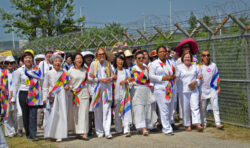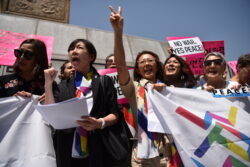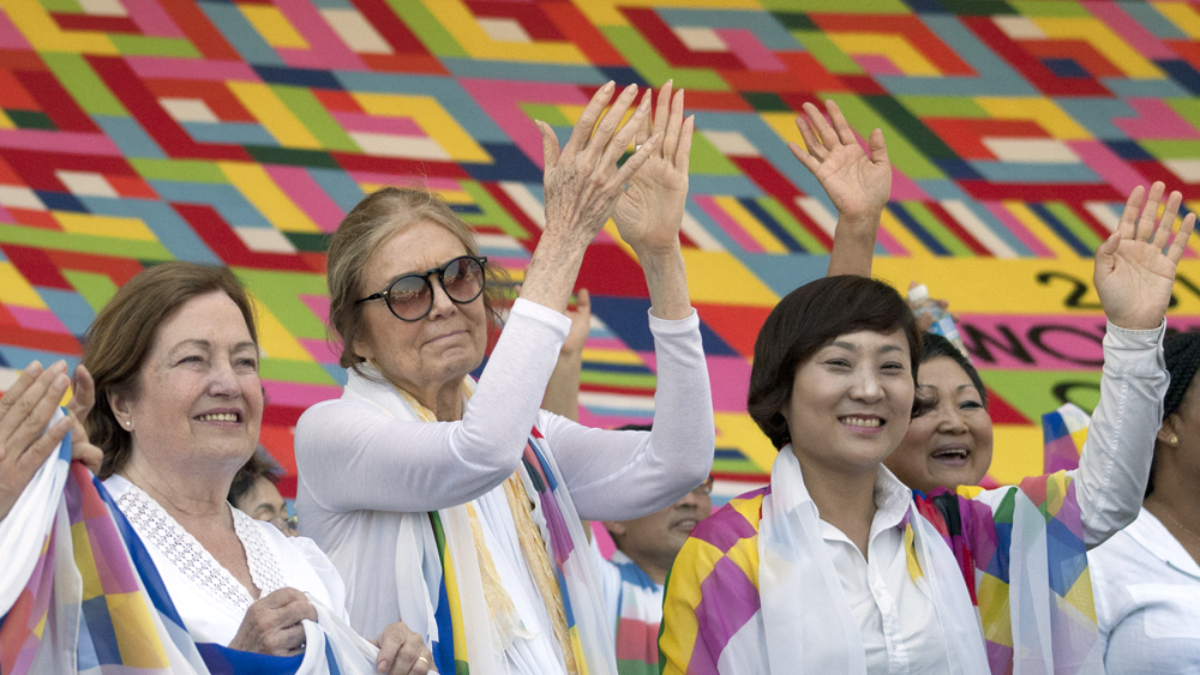“Crossings” takes viewers on a tour of the two Koreas
Feminist scholar Gloria Anzaldúa wrote, “Borders are set up to define the places that are safe and unsafe, to distinguish us from them. A border is a dividing line, a narrow strip along a steep edge.”
Borders, Anzaldúa argues, are never naturally occurring but instead are manmade. Inarguably, one of the most controversial borders in the world today is that of the demilitarized zone (or the DMZ) separating North and South Korea. Located near the 38th parallel, the separation of the countries was delineated by the United States and the Soviet Union at the end of World War II.
It’s this border that a group of 30 women attempted to cross in 2015. Film director Deann Borshay Liem was invited to document the historic event. Her film “Crossings” follows these women’s peacemaking mission and gives viewers an inside look at life in both Koreas. The extraordinary effort led by Korean American activist Christine Ahn, the Founder and Executive Director of Women Cross DMZ, shifts preconceptions about Korean life and what is required to achieve peace.

Crossing the border. (Image Credit: Crossings)
For nearly 70 years now, the 39th parallel has stood firm. Actively protected and guarded, every year, the United States and South Korea conduct a controversial combined field training exercise, always vigilant and ready. On the other side, the world receives select and curated messaging from the North Korean communist government and our imaginations fill in the rest. But what is lost in these militaristic snapshots of the two Koreas are the tragic consequences of the ongoing division of a people.
Liem, who has covered films previously on transnational adoption, became interested in this project because the stories of divided families resonated with her own life experience.
“I was separated from my Korean birth family in South Korea through international adoption,” Liem said, “and later learned that this kind of transnational adoption of Korean children from the Korean War period to the present really is part of this larger context of national division. I also have family in the North from my husband’s side.”
Ahn and Liem were joined by women activists from around the world including Abigail Disney, Gloria Steinem, Liberian peace activist and Nobel Laureat Leymah Gbowee, as well as grassroots women activists from Japan, Okinawa, Colombia, Guam, and the Philippines.

Why all women? Liem explained that women and children are underrepresented in foreign policy circles. “In my experience, a lot of the war narratives are from men,” Liem said, “and women tend to defer the storytelling of their experiences […] to their husbands or partners. I would really love to see a greater emergence of women’s voices in telling stories about war, because it is just amazing what women did to survive and support their families.”
Although the women are united under the three calls to action, many in the cohort admitted to feeling uneasy about being in North Korea and having to take a neutral stance for the duration of the trip. Opposition to the delegation decried the trip’s neglect of ongoing human rights violations in North Korea; nevertheless, the group was welcomed with open arms and each day held a packed agenda that included visits to a local school, a birthing center, and the birthplace of Kim Jong-Un.
“It’s very difficult for us to travel to North Korea without having a lot of preconceptions and stereotypes and ideas of what North Korea is and what North Korean people are like,” Liem shared. “Because we tend to see them as lacking free will and being kind of like robots and automatons, as if they’re not real people”
Although there were still many questions left unanswered, it became clear that there is much more going beneath the highly orchestrated visits. In talking to their tour guides, Liem captures the typical hopes and dreams of a North Korean woman, and they are similar to so many around the world — to have a job and one day, a family. In another scene, the activists were surprised that health services for pregnant women included complete and full care and that the soon-to-be mothers were allowed to arrive at the hospital the minute that their contractions began. Life in North Korea includes children who flourish.
At the end of the day, the quest of mobilizing a sense of empathy for North Korean people as people – who are living their lives to the fullest – seems to be just one outcome of the trip.
But that’s only half the journey. After days of negotiating with South Korea and the United Nations, the group is finally allowed to cross the border — but not through the Joint Security Area as originally planned. On the other side of the DMZ, the peacemaking group is met by protests and strict security protocol, including a briefing on the National Security Act, which bars speech and behavior in support of North Korea.
At one point, the group is surrounded by protestors, and Steinem notes that this kind of freedom of speech is what democracy looks like. Ironically, the juxtaposition of the North and South is made clear in that statement. Unrest can only occur in a democratic state and order is a mark of communism.
Overall, the film balances the will-they-or-won’t-they be able to cross drama with a historical narrative that informs the audience of the United States’ continued involvement, inclusive of President Donald Trump’s outreach campaign. The question of whether the nation of Korea will ever reunite remains up in the air but what becomes clear is how Asian Americans, like Christine Ahn, can better support the people of both Koreas — encourage American withdrawal and allow peace to come about through discussions that involves Korean peacemakers on both sides.
Giannina Ong is the Editor-in-Chief of Mochi Magazine. During the day, she’s a researcher, activist, and digital communications manager. She holds a master’s from University of Toronto’s Women and Gender Studies Institute. A spot-on Taurus (sun and rising), she is also a retired athlete, pasta-loving writer, and overeager editor. You can follow her on Instagram @ThisIsGiannina.
“Crossings” screened at the 45th Asian American International Film Festival.

